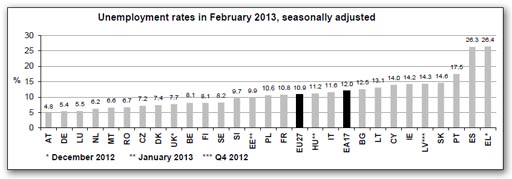The serious bit of what was once the serious media is highlighting what is being described as a Europe-wide unemployment crisis, with the headline rate for the eurozone at 12 percent and the EU27 standing at 10.9 percent.
This is according to the latest data from Eurostat, which makes the comparison with last year when the unemployment rates were 10.9 and 10.2 percent respectively. By contrast, the unemployment rate in the US was 7.7 percent in February 2013 – the same as in the UK - and in Japan it was 4.2 percent in the January.
For European Union countries, this toll of unemployment represents an estimated 26.338 million out of work, of whom 19.071 million are in the eurozone.
The lowest unemployment rates were recorded in Austria (4.8 percent), Germany (5.4 percent), Luxembourg (5.5 percent) and the Netherlands (6.2 percent). Predictably, the highest rates were in Greece (26.4 percent in December 2012), Spain (26.3 percent) and Portugal (17.5 percent).
Compared with a year ago, the unemployment rate increased in nineteen EU member states and fell in eight. The highest increases were registered in Greece (21.4 to 26.4 percent between December 2011 and December 2012), Cyprus (10.2 to 14.0 percent), Portugal (14.8 to 17.5 percent) and Spain (23.9 to 26.3 percent).
The largest decreases were observed in Latvia (15.6 to 14.3 percent between the fourth quarters of 2011 and 2012), Estonia (10.8 to 9.9 percent between January 2012 and January 2013) and Ireland (15.1 to 14.2 percent).
Outside the EU, much is made of the unemployment rate in Iceland, which has decreased to 4.70 percent in February of 2013 from 5.70 percent in January of 2013. Historically, from 1970 until 2013, the rate averaged 2.19 percent reaching an all time high of 9.30 percent in February 2010, after the financial crash.
So remarkable has been the Icelandic recovery that this island nation has been mooted as a modelfor Cyprus.
However, it should be noted that the recovery in Icelandic employment has been led by an expansion of the fishing industry and aluminium smelting, the latter relying on the cheap energy available from hydroelectric sources and hot thermal springs.
The success of the fishing industry relies to a very great extent on Iceland not being a member of the EU and not being saddled by the CFP. Aluminium smelting has benefited from the closure of plants elsewhere in the EU, not least the UK.
Arguably, therefore, Iceland's answer to the unemployment problem is to stay outside the EU, although if all the other member states followed suit, that advantage might be reduced. But it does seem to be the case that small economies can prosper from the wreckage of their larger neighbours, as long as they remain independent.
How the larger continental land mass of Europe is going to resolve its unemployment problems, though, is a different question – and one which the "colleagues" seem unable to answer. While the European Union might be good at providing jobs for its own officials, it doesn't seem to have the knack of extending employment to the rest of the population.
COMMENT THREAD
